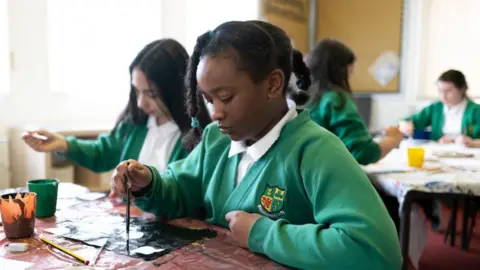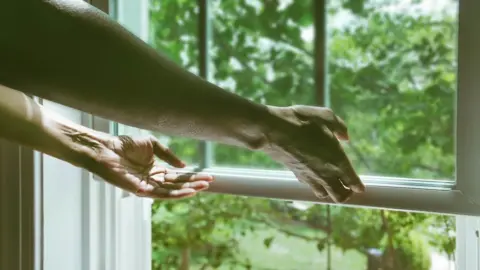Covid: Ministers accused of U-turn over ozone machines
 Getty Images
Getty ImagesMinisters have been accused of making a "spectacular U-turn" over devices designed to disinfect classrooms.
Welsh ministers had announced they would spend £3.31m on new ozone machines developed by Swansea University.
But two days later BBC Wales was told no decision was taken to buy them, with ministers to take expert advice first.
It followed calls for reassurances over safety from Plaid Cymru and the Conservatives.
The Technical Advisory Group of experts to the Welsh government will look at results of early trials of the machines "before any procurement process begins", the government said.
Last Monday, Education Minister Jeremy Miles announced £6m for 30,000 carbon dioxide sensors and 1,800 ozone disinfecting machines.
The Welsh government said at the time that ozone machines would be used to disinfect spaces after a Covid outbreak.
Swansea University said "extensive testing had taken place over eight months" within its classrooms "as well as in three very different school scenarios".
Ozone is a toxic gas and can damage the lungs if inhaled, but the university said the machines could be used when no pupils were present and were extremely effective at removing Covid.
The Welsh government previously said the funding was "expected to supply more than 1,800 machines, at least one for every school, college and university in Wales".
But opposition parties called for reassurances - Plaid Cymru said the Welsh government needed to be satisfied it was a safe option, while the Tories called for confirmation of "robust measures" to stop people coming into contact with ozone.
Allow X content?
In a piece on Nation.Cymru, fresh air campaigner Dr Eilir Hughes wrote: "Using ozone to disinfect does seems counterintuitive. In an attempt to lower the risk of harm to human health, we are using toxic chemicals when safer alternatives are available."
'Something doesn't add up'
Plaid's health spokesman Rhun ap Iorwerth said ministers "now seem to have performed quite a spectacular U-turn following serious concerns by medical professionals and scientists about the safety of these machines - now claiming they only considered their use and have not even begun the procurement process. Something doesn't add up".
He added "serious questions need to be asked about the government's judgment in deciding to roll out these particular machines into our schools, colleges and universities - a few days before students begin returning after the summer break".
Before the statement was issued by the Welsh government, a headteachers' union said it had seen little detail about the machines.
Laura Doel, director of NAHT Cymru, said: "As yet, we have received few details on the ozone disinfecting machines, we don't know how effective they are, we don't know if the amount being proposed for schools are going to be sufficient and we don't know when they will be available.
"We are still waiting to see the evidence that supports their use."
Ministers are also spending £2.58m on CO2 traffic light monitors for classrooms, seminar rooms and lecture halls.
The Welsh government said they would provide a "visual signal" of deteriorating air quality when levels of CO2 rise, with the hope it will aid the control of ventilation.
Neil Butler, the national officer in Wales for NASUWT, welcomed the announcement of the CO2 machines but said it was not clear when they would be rolled out.
"Really, we could do with these CO2 detectors being in our schools now as we enter into the winter period," he said.
With term beginning in west and north Wales on Wednesday, and the rest of the country on Thursday, he added: "It is too late in the sense that schools are back."
 Getty Images
Getty ImagesThe Welsh government said earlier this week that the machines were "specifically for the disinfection of empty indoor space".
A spokesman added: "Protecting children and young people from coronavirus is a top priority for us. We have made significant funding available for measures to monitor ventilation in schools, colleges and universities and reduce the risks of airborne transmission of Covid 19.
"This investment includes the installation of over 30,000 CO2 sensors for schools and educational settings in Wales. We have also considered the use of ozone machines to see if they can play a role in reducing disinfection times.
"Our Technical Advisory Group will now consider the results from the early trials of these machines and provide further advice on their use within education settings before any procurement process begins."
The Welsh government said the CO2 monitors would be deployed as soon as possible.
A Swansea University spokeswoman said the machines would have strict safety rules, adding: "For example, no-one is allowed in the room when the machine is operating, and it can be password protected.
"The whole cycle typically takes only a few hours, can easily be run after school and when no pupils are present.
"These machines will help us get rooms, such as classrooms, back in use quickly and safely after an outbreak."
The university said it had an ozone destructor "which removes all the ozone to below safe levels at the end of the disinfection cycle".

- ELY BREAD RIOTS 30 YEARS ON: There are two sides to every story
- THE CASABLANCA: How a Cardiff nightclub changed our lives

